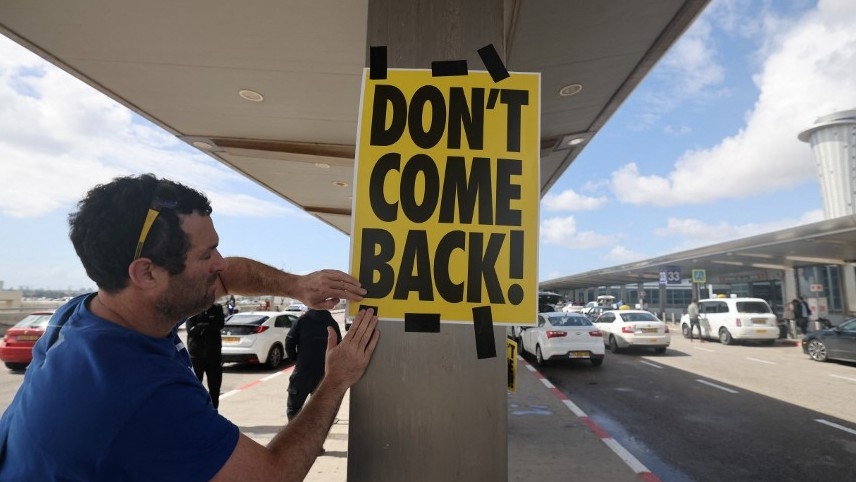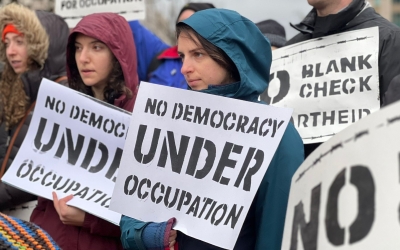Israeli protesters block airport ahead of Netanyahu's trip to Berlin

Israeli protesters once again attempted to restrict access to Ben Gurion airport on Wednesday, as Prime Minister Benjamin Netanyahu was due to depart for Germany on an official trip, a day after parliament voted to approve a bill that opponents reject as a "judicial coup".
The protests, now in their tenth week, are part of a mass movement of anti-government activities against a plan unveiled by Justice Minister Yariv Levin in January to reform the judiciary.
The plan is supported by the right-wing governing coalition led by Netanyahu, which includes ultra-Orthodox and far-right parties.
Protesters at Ben Gurion airport on Wednesday held placards reading: "Dictator on the run" and "Don’t come back", while cars bearing Israeli flags circulated between the terminals, making them difficult to access, an AFP correspondent reported.
Similar protests were also held outside the airport last week ahead of Netanyahu's trip to Rome, prompting police to crack down on protesters and detain several people.
On Tuesday Israel’s parliament, the Knesset, moved a step closer to passing the controversial bill that would allow politicians to overturn High Court judgements with a simple majority, as well as appoint judges. The bill requires three readings before it becomes law, with two readings already approved as of Wednesday.
In an overnight session that stretched into the early morning, the Knesset also approved several other pieces of legislation, including legislation that would prevent the country’s attorney general from declaring Netanyahu unfit for office.
The prime minister would only be declared unfit for office due to physical or mental inabilities and then only declared so by the prime minister himself or by a vote of three-quarters of cabinet members.
In a further potential blow to the judiciary, the Israeli parliament also voted for a bill that would require a consensus of 12 out of 15 judges to strike down legislation that was ruled unconstitutional.
The same bill would also allow parliament to override the Supreme Court with a simple majority while demanding a supermajority for the highest court to do the same.
As it stands, only a simple majority is needed in the Supreme Court to strike down laws passed by the Israeli parliament.
Israeli newspaper Haaretz reported on Wednesday that Netanyahu would cut his trip to Berlin short, "following criticism from top security officials due to a classified security incident earlier this week".
The prime minister is scheduled to meet with German Chancellor Olaf Scholz and President Frank-Walter Steinmeier, who are under pressure to condemn his government's planned judicial overhaul. He is also due to visit the UK later this month.
'A national nightmare'
In an open letter on Sunday, more than 250 US business leaders and politicians warned that Israel’s judicial reforms will make it "increasingly difficult" to defend the country internationally.
"Many leaders in the business community will feel compelled to reevaluate their reliance on Israel as a strategic destination for investment, sourcing talent, building engineering centres, and maintaining intellectual property," business leaders warned in their open letter.
Netanyahu is currently on trial for corruption, and the reforms could enable him to evade a conviction or see his case dismissed.
Since being indicted in 2019, Netanyahu has railed publicly against the justice system, calling it biased against him.
Meanwhile, proponents of Levin's plan criticise the Supreme Court for being left-leaning, elitist and too involved in politics.
But critics say the plan will weaken the country's already fragile checks and balances system by curbing the Supreme Court's power to strike down laws passed by the legislature.
They fear it will slide the country further into authoritarian rule and give politicians unchecked powers.
Tens of thousands of people have organised weekly rallies on Saturdays since the plan was announced two months ago, demanding the government scrap it completely.
More recently, they have organised mass strikes and civil disobedience actions during workdays, blocking major roads and marching outside the offices and residences of government ministers.
In the meantime, Israeli President Isaac Herzog has been leading efforts to bring the government and the opposition to the negotiating table.
He called the current political turmoil a "national nightmare" and warned it will lead to a "catastrophe" if not resolved soon.
In light of the proposed reforms, the Israeli currency has declined and the leading US financial institute JPMorgan has warned of a growing risk of investing in the country.
Polls, experts and veteran politicians say the current crisis reveals deep divides in Israeli society. Many have warned current tensions could slide the country into civil war and violence if a solution is not found soon.
Middle East Eye propose une couverture et une analyse indépendantes et incomparables du Moyen-Orient, de l’Afrique du Nord et d’autres régions du monde. Pour en savoir plus sur la reprise de ce contenu et les frais qui s’appliquent, veuillez remplir ce formulaire [en anglais]. Pour en savoir plus sur MEE, cliquez ici [en anglais].






